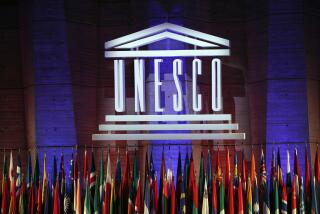U.N. Council OKs Macedonia--Minus Name and Flag
WASHINGTON — The U.N. Security Council, trying to ease its way past hatreds that date more than two millennia to the conquering days of Alexander the Great, finally approved membership in the United Nations for the little republic of Macedonia on Wednesday but under a temporary name and a flag that will not fly in front of U.N. headquarters.
Greece, furious over the former Yugoslav republic’s use of the name Macedonia, blocked its entrance to the United Nations for 18 months but finally withdrew the objection under a complex compromise.
The Security Council’s unanimous vote sends the membership application to the General Assembly, where swift approval is expected today. Macedonia will become the 181st member of the United Nations.
But it will not be listed officially as Macedonia. Under the compromise, the Security Council admitted the little country of 2 million under the temporary name, “the former Yugoslav Republic of Macedonia.”
An arbitration committee, led by former Norwegian Foreign Minister Thorvald Stoltenberg and former British Foreign Secretary Lord Owen, was instructed by the council to arbitrate the dispute and come up with a name within two months. Stoltenberg, taking the place of former Secretary of State Cyrus R. Vance, is soon to join Owen as the U.N. mediator trying to achieve a peace settlement in another former Yugoslav republic, Bosnia-Herzegovina.
Greece, which claims that the Macedonian republic has aggressive designs on the northern Greek province of Macedonia, also objected to the flag of the new U.N. member. The flag displays the 16-sided Star of Vergina, symbol of the dynasty of Philip of Macedon and his son, Alexander the Great, in the 4th Century BC. Greece regards Philip and Alexander as Greek and looks on Slavic Macedonia’s adoption of the star as another sign of aggressive intent.
To satisfy the Greek objection, Macedonia agreed that its flag would not fly alongside those of the other U.N. members on the poles that rim the organization’s headquarters--at least not until the Owen-Stoltenberg committee rules on whether the flag is acceptable.
In Athens, Greek Foreign Minister Michalis Papakonstantinou, while supporting the Security Council decision, insisted that negotiations on the name and the flag “will be difficult.” Macedonian President Kiro Gligorov, reiterating that Macedonia has no claims on the territory of Greece or any other country, left the capital of Skopje on Wednesday to be on hand for the final General Assembly approval.
Macedonia is hosting 700 U.N. peacekeeping troops who patrol its borders with Albania and the Serbian province of Kosovo. In an unprecedented act of what the United Nations calls “preventive diplomacy,” the peacekeepers were sent there at the end of last year to head off a wider Balkan war.
There is a fear throughout Europe that Serbia, when it is through with its conquest of Bosnia, will turn its weapons of “ethnic cleansing” on Kosovo, a province populated mainly by ethnic Albanians. The suppression of Kosovo would surely draw in Albanian government troops, experts say. To reach Kosovo, however, they would have to cross Macedonia. The presence of the peacekeepers is designed to discourage both the Serbian suppression and an Albanian invasion--and the possibility that Greece, Bulgaria and Turkey would be drawn into a war as well.
More to Read
Sign up for Essential California
The most important California stories and recommendations in your inbox every morning.
You may occasionally receive promotional content from the Los Angeles Times.










